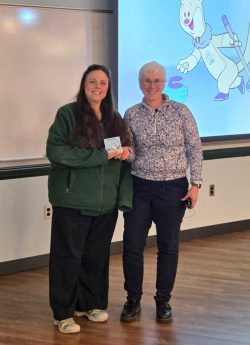
The Agnew Laboratory focuses on comparative reproductive pathology, zoo and wildlife pathology, conservation biology, infectious diseases in the bovine reproductive tract, and international development and livestock diseases, particularly in Ghana.
Dalen Agnew, DVM, PhD, DACVP, is researching reproductive lesions of captive suids, ovarian carcinoma in jaguars, reproductive lesions of polar bears, reproductive and aporcine gland disease of African painted dogs, and digital tools to enhance pathology collaborations with colleagues in Africa.
Previous Events

Agnew Lab at Phi Zeta Day 2024
Recognitions:
- Amanda Grether won the award for best DVM Presentation at Phi Zeta Day 2024
- Lindsay Coleman won an award for the best DVM Poster at Phi Zeta Day 2024
Current Research
G-Protein coupled receptor in canine placenta
G-protein coupled receptors (GPCRs) are a large family of receptors on mammalian cell surfaces, with many involved in the sense of smell. The rest, called endoGPCRs, regulate various body functions and are important for drug development. However, little is known about GPCRs in the canine placenta. The dog genome has about 1438 GPCRs, with 353 of them being endoGPCRs. This study aims to identify the endoGPCRs in the canine placenta before and after birth.
Reproductive Tract Lesions in Giraffe and Okapi
The giraffe and okapi are classified as Vulnerable and Endangered species, respectively. The Species Survival Plan (SSP) provides recommendations for breeding and contraception to ensure the preservation of genetic diversity. Our objective is to document naturally occurring reproductive tract lesions and evaluate the impact of age, parity, and contraception on lesion prevalence. This research aims to contribute valuable insights that will support and enhance the effectiveness of the Species Survival Plan for both giraffes and okapi moving forward.
Polar Bear Vulvar Dermatitis
Captive polar bears in U.S. zoos have experienced limited reproductive success, with a significant percentage of female bears exhibiting lesions that may be impacting their fertility. A thorough understanding of common reproductive pathologies is crucial for enhancing breeding programs and optimizing population management. This study aims to characterize reproductive lesions in captive female polar bears, with the goal of promoting successful reproduction and improving treatment strategies in the future.
Male reproductive aging: Characterization of age-related changes in red wolf and Mexican grey wolf testes
Red wolves are critically endangered, with fewer than 300 individuals remaining in the wild. Limited information exists regarding male reproductive health in wild canid species, particularly concerning histological changes in testicular tissue. This study aims to investigate the correlation between seminiferous tubule degeneration and age. The seminiferous tubules, which constitute the majority of testicular tissue, are essential for spermatogenesis. The primary objective of this research is to provide data that will inform breeding recommendations and contribute to the advancement of species conservation efforts moving forward.
Characterization of reproductive lesions in captive xenarthrans
Recent Publications
Bi-Macroaggregated Albumin Inhibited Mouse Melanoma Growth by Regulating Cell Cycle Checkpoint Markers Without Promoting Living Cell Repopulation. J Nucl Med. 2025 Apr 3 https://jnm.snmjournals.org/content/early/2025/04/03/jnumed.124.269190.long
Certifying "day one ready" pathologists: Are we accomplishing our goals? Vet Pathol. 2025 Mar https://journals.sagepub.com/doi/10.1177/03009858241302843?url_ver=Z39.88-2003&rfr_id=ori:rid:crossref.org&rfr_dat=cr_pub%20%200pubmed
Clinical Scaleup of Humanized AnnA1 Antibody Yielded Unexpected High Reticuloendothelial (RES) Uptake in Mice. Antibodies (Basel). 2025 Feb 6 https://www.mdpi.com/2073-4468/14/1/14
Endocrine Diagnostics: Principles and Applications. Vet Clin North Am Exot Anim Pract. 2025 Jan https://www.sciencedirect.com/science/article/pii/S1094919424000367?via%3Dihub
Atypical granulation in neutrophils of a domestic shorthair cat. Vet Clin Pathol. 2024 Jun https://onlinelibrary.wiley.com/doi/10.1111/vcp.13356
Recurrent and convolutional neural networks for sequential multispectral optoacoustic tomography (MSOT) imaging. J Biophotonics. 2023 Nov https://onlinelibrary.wiley.com/doi/10.1002/jbio.202300142
Pathology of Perinatal Disorders. Vet Clin North Am Small Anim Pract. 2023 Sep https://www.sciencedirect.com/science/article/pii/S0195561623000700?via%3Dihub
Endometrial hyperplasia with loss of APC in a novel population of Lyz2-expressing mouse endometrial epithelial cells. Carcinogenesis. 2023 May 15 https://academic.oup.com/carcin/article/44/1/54/6957331
New K50R mutant mouse models reveal impaired hypusination of eif5a2 with alterations in cell metabolite landscape. Biol Open. 2023 Mar 15 https://journals.biologists.com/bio/article/12/3/bio059647/297287/New-K50R-mutant-mouse-models-reveal-impaired
Piscichuvirus-Associated Severe Meningoencephalomyelitis in Aquatic Turtles, United States, 2009-2021. Emerg Infect Dis. 2023 Feb https://wwwnc.cdc.gov/eid/article/30/2/23-1142_article
What is your diagnosis? Abdominal mass from a dog. Vet Clin Pathol. 2022 Dec https://onlinelibrary.wiley.com/doi/10.1111/vcp.13082
Super-resolution and segmentation deep learning for breast cancer histopathology image analysis. Biomed Opt Express. 2022 Dec 5 https://pmc.ncbi.nlm.nih.gov/articles/PMC9841988/
Distribution of canine distemper virus and nectin-4 in raccoon (Procyon lotor) skin. Vet Pathol. 2022 Sep https://journals.sagepub.com/doi/10.1177/03009858221102598?url_ver=Z39.88-2003&rfr_id=ori:rid:crossref.org&rfr_dat=cr_pub%20%200pubmed
Reproductive one health in primates. Am J Primatol. 2022 May https://onlinelibrary.wiley.com/doi/10.1002/ajp.23325
